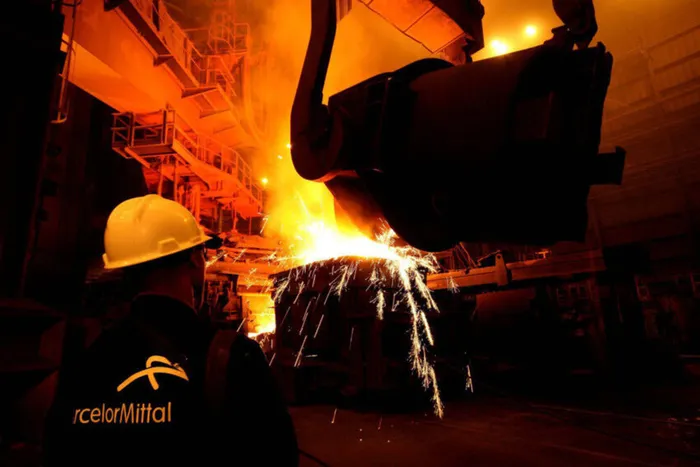ArcelorMittal South Africa faces challenges until government addresses regulatory issues
STEEL

An ArcelorMittal South Africa steel foundry. The government has committed to address the steel industry regulatory environment in the face of rising imports that have been subsidised by the governments of the exporting countries.
Image: Supplied
Large parts of the domestic steel industry were brought to their knees in 2024 due to inertia on the part of government, and regulations should have been more responsive to realities on the ground, said ArcelorMittal South Africa’s chairman Bonang Mohale.
In February, the country’s biggest steelmaker announced plans to close its Longs Business, a move expected to result in the loss of thousands of jobs and severely impact the manufacturing sector. However, intervention by stakeholders including the Industrial Development Corporation (IDC) meant that in March, a decision was taken to operate the Longs business for a further six months.
In the meantime, the government had committed to addressing structural problems including the Price Preference System (PPS) and scrap export taxes, as well as tariff measures including safeguards and others.
Writing in the latest annual report on Thursday, Mohale said a particular burning issue during 2024 was the lack of action on the artificially low scrap pricing.
“Such is the prevailing scrap environment that it had the effect of unfairly subsidising our Longs business’s competitors by more than R1 000 per ton, an unfair advantage that is almost certainly without parallel anywhere else in the world,” he said.
He said the Chinese economy affected most of the world’s steel industry again in 2024 through “an unrelenting export of primary and finished steel, impacting producers such as ourselves, particularly given our authorities’ continuing reluctance to impose meaningful trade remedies.”
He said it was clear in 2024 that China had prevailed in the battle for supremacy in the automotive sector, in that it could produce steel-intensive cars for a third of the price that other manufacturers were forced to charge, which had decimated the automotive industries of traditional vehicle makers such as Germany.
“It was indeed gratifying that in March 2025 we were able to announce that additional support from the IDC, coupled with specific government undertakings, allowed us to continue operating Longs for at least a further six months,” he said.
He said a scaled-down, focused ArcelorMittal South Africa would be increasingly attuned to the need to deliver a rising tide of growth.
“Moving forward, we as a country need five pieces of the national puzzle to fall into place: we need transformation, ethical leadership, good governance, service delivery, and law and order,” he said, adding that he hoped the new government of national unity would see these goals achieved.
CEO Kobus Verster said the manufacturing, steel fabrication, and the machinery and equipment sectors in South Africa, as well as construction, all recorded negative growth last year. In most instances, this was after several preceding years of contracting output.
“Key steel-consuming sectors, agriculture and automotive, returned double-digit negative growth. The economy limped to growth of under one percent while there was little evidence of any large-scale infrastructural investment,” he said.
“For Longs, the highest priority, we argued, should have been given to urgently and decisively reviewing the scrap export tax, the scrap pricing system and its administration (which currently is easily manipulated by unscrupulous participants). Collectively, these aspects have unfairly prejudiced us as the only local company beneficiating our country’s wealth of iron ore,” said Verster.
He said the surge in global steel exports saw ArcelorMittal South Africa’s net realised prices fall to multi-year lows in 2024, last seen (apart from during the Covid-19 pandemic) in 2015/2016.
At 1.36 million tons, imports represented 33.6% of local consumption, up 3% from 2023. While flat steel imports increased by 1.5%, long imports rose by 108% to some 193,000 tons.
“Most imports are unfairly subsidised, a reality that has prompted a raft of meaningful trade remedies around the world,” said Verster. The European Union, UK, US, Japan, and most other countries with primary steel industries expanded their tariff regimes, and in 2024 the Southern African Customs Union was left very exposed to injury/dumping.
ArcelorMittal SA’s management had responded by trying to raise government and market awareness of the damage posed by a surge in subsidised exports, and in response, a provisional safeguard on hot rolled products was introduced in July but lapsed in January 2025. The authorities also announced an anti-dumping duty on heavy sections.
Duties on the export of scrap steel and a so-called pricing preference system (PPS) served to keep scrap prices artificially low. These mechanisms favoured electric arc furnace makers of, in particular, long steel, giving them an unfair advantage over integrated steelmakers.
“In 2024, we operated at a disadvantage relative to these producers (many of which are backed by public funding of some R8.5 billion per annum in subsidies). This reality was largely responsible for putting our Longs business at risk,” the group management said.
Raw materials made up 46% of cash costs in 2024. The locally sourced negotiated iron ore prices were 11% up relative to those of the previous year, while international coal prices fell by 18.4% in 2024 compared to the previous year.
Some R3.2bn was spent on buying electricity from Eskom, up 14% on 2023. Since 2007, electricity tariffs have increased by more than 800%.
In 2024, poor performance by Transnet Freight Rail (TFR) resulted in “considerable lost production and sales." Over the past three years, rail tariff increases had outstripped inflation.
“In 2024, the performance of our Longs business translated into an operational EBITDA drain of R1.67bn (2023: R655 million loss). Process and raw material cost savings, together with stringent cash management and Value Plan savings, made it possible to maintain our net borrowing position at a level similar to that of the previous year,” the group said.
Business Report